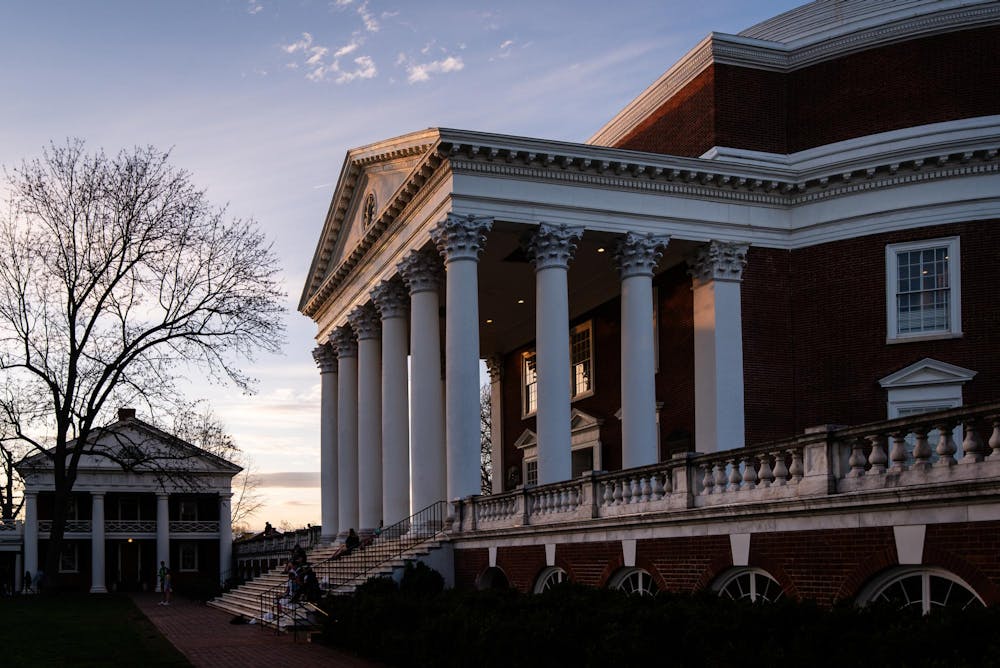It would seem the University’s Board of Visitors Rector Rachel Sheridan finally found the time to talk with — or really write a letter to — the Faculty Senate about her role in both former University President Ryan’s forced resignation and the University’s agreement with the federal government. The impetus for this show of candor — a Faculty Senate resolution calling for her resignation — leaves much to be desired from this University administration. Yet, while Sheridan, and presumably Vice Rector Porter Wilkinson, tried fruitlessly to defend their roles as unauthorized University negotiators in writing, Interim University President Paul Mahoney actually showed up to the Faculty Senate meeting and gave senators a public account of the Department of Justice agreement. Unfortunately, this display of transparency is too little, too late.
The story of the University’s U-turn is an instance where reality really is stranger than fiction. Not one week after rejecting the Trump administration’s “Compact for Academic Excellence in Higher Education,” Mahoney bewilderingly chose to sign an agreement with the federal government — one that contains the precise vices that made the Compact objectionable. Yet, the University’s agreement with the Trump administration reeks not only because of its terms, but also for the method in which it was composed.
Speaking via mass email Oct. 22, Mahoney both revealed the existence of such an agreement and also that he had signed it without soliciting any input from the public. With the Compact, the University committed to an extended period for feedback and debate. This allowed the community to make known their objections, which Mahoney then addressed in a subsequent public statement. Yet for an agreement that is at least as objectionable as the Compact, the case was completely reversed. Such a blatant rebuff to the precedent set after debates over the Compact insults those who truly believed this University administration was willing to listen to its stakeholders. By working in the shadows, Mahoney and the administration chose to betray the very tenet of transparency required for a public institution of higher education.
The hilarity of the agreement is that it was presumably being finalized precisely as Mahoney was rejecting the Compact and committing to the ideals of open discussion at the University. Where was this commitment in the agreement? Surely, the importance of transparency when negotiating with the federal government does not change because the document switches names. Indeed, the agreement and Compact both included ambiguous standards and the specter of continual federal investigation, yet apparently only the latter document warranted a public discussion. Public institutions have a duty to be transparent in matters of great import — and one would have hoped that Mahoney would accept this duty in all negotiations with the federal government, not just some.
As a state institution, the University must live up to a higher level of scrutiny than private universities. While private universities such as Columbia University or Brown University might have more leeway to unilaterally deal with the federal government, the University, as a public institution, does not enjoy that same privilege. Here, both its legal status as a state university and tradition of shared governance compel the University to include its community in the decision-making process to the greatest practical extent.
The Agreement between the University and the Trump Administration — despite what Mahoney might claim — leaves the University in a much worse position than if it had not signed. In fact, the Agreement allows the United States to pursue monetary fines at its “sole discretion,” potentially jeopardizing money paid by taxpayers. Such an invitation to extort our University and the Commonwealth writ large could have at least been met with a forum for discussion rather than an email at the end of the business day. Now, this commitment has been corrupted by sneaking a new agreement under the taxpayers' noses.
With the agreement, who signed it matters just as much as how it was signed. It cannot be ignored that this agreement was signed by an interim University president. Such momentous undertakings are better suited for fully-fledged leaders who stand as symbols of stability, rather than mere interims whose very position is meant to be replaced. Of course, tough decisions must sometimes be made in the moment — yet even if Mahoney felt it was within his right to negotiate on behalf of the University, that fact alone makes plain the need for open and honest discussion. Community engagement serves as a guidepost for interim officials to navigate their definitionally temporary office. A lack of openness from officials — interim or not — at public universities should not and cannot be repeated.
Mahoney would be wise to remember the second part of that oft-quoted line from Thomas Jefferson he utilizes in his email announcing the agreement — “for here we are not afraid … to tolerate any error so long as reason is left free to combat it.” Error cannot be confronted unless it is submitted to scrutiny, including scrutiny by the community invested in the University. And public accountability cannot be something to which Mahoney only submits himself weeks after making a unilateral decision on behalf of the whole institution. Ultimately, the agreement’s terms can be debated for ages. What will really stick with those formerly hopeful of increased transparency from Mahoney, however, is his reversal in willingness to trust the community, symbolized by the unseemly nature of the agreement’s formation and signature.
Michael King is a senior associate opinion editor who writes about politics for The Cavalier Daily. He can be reached at opinion@cavalierdaily.com.
The opinions expressed in this column are not necessarily those of The Cavalier Daily. Columns represent the views of the authors alone.







